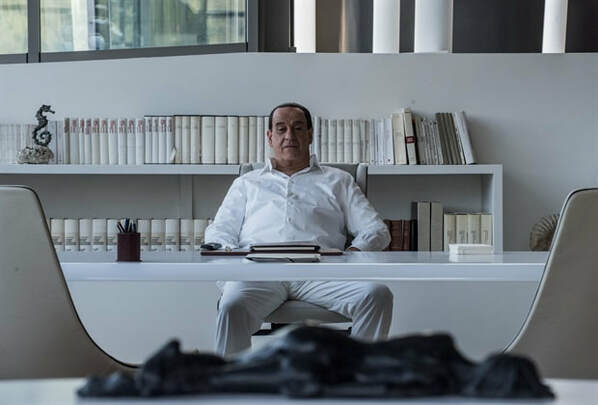LORO
****
Director: Paolo Sorrentino
Screenwriters: Paolo Sorrentino and Umberto Contarello, from a story by Sorrentino.
Principal cast:
Toni Servillo
Elena Sofia Ricci
Riccardo Scarmaccio
Kasia Smutniak
Euridice Axen
Fabrizio Bentivoglio
Country: Italy/France
Classification: MA15+
Runtime: 150’
Australian release date: Thursday 17 January 2019
Previewed at: The Italian Film Festival, Sydney, on Monday 17 September 2018.
Tutto vero, tutto falso (all true, all false) is the tagline for Loro, the latest film from the great Italian director Paolo Sorrentino, and it couldn’t be more fitting because the subject of the movie is the Italian Trump, the chameleon Silvio Berlusconi. The director describes it as, “a fictional tale in costume, that narrates probable or invented facts in Italy between 2006 and 2010.” After all, Berlusconi is a hard man to pin down, despite an appearance of being an open book – he once mailed a picture-biography of his life, Una storia italiana (An Italian story), to every Italian voter! Once again, Sorrentino’s lead actor is Toni Servillo, making this the fifth time in their careers the pair have collaborated, after the director’s first film One Man Up (2001), followed by The Consequences of Love (2003), Il Divo (2008), Special Jury Prize-winner at the Cannes Film Festival, and The Great Beauty (2013), winner of the Academy Award for Best Foreign Film. From the evidence on screen, they obviously enjoy working together and bring out the best in each other.
The title Loro is Italian for ‘them’ but it could also be a play on the word ‘l'oro’, meaning ‘gold’, where the gold is power, or access to it; in either case, an extremely valuable commodity. The first part of the story focuses on a young hustler, Sergio Morra (Riccardo Scarmaccio), who, wishing to access the world of political power, sets his sights on establishing a relationship with Berlusconi (Toni Servillo). At the time, the media mogul was in political opposition to the government, no longer Prime Minister, but Morra could see his star rising again so he rented a villa across from Berlusconi’s in Sardinia and hosted vast parties where drugs and armies of semi-naked, beautiful young women were on obvious show. The mogul/politician, though, proves hard to trap because he’s going through a difficult time with his second wife Veronica Lario (Elena Sofia Ricci) and is trying to win back her affections. The latter half of Loro is more concerned with the machinations of other, slightly less obvious, hustlers as they try to ingratiate themselves with the distracted Berlusconi; these ones are senators, businessmen and media personalities and they’re all jockeying for position in the lead-up to new national elections. It’s a Machiavellian minestrone.
Perversely, Sorrentino takes an almost sympathetic view of Berlusconi, the man, as against the politician. He says, “As far as I'm concerned, a man is the result of his feelings, rather than the biographical sum of his facts. So within this story, the choice of facts to recount is not based on the current events of those years, but instead and exclusively attempts to dig, groping, into his conscience. So what were the feelings that motivated Silvio Berlusconi's days in those years? What were the emotions, fears and disappointments of this man facing events that seemed like mountains? This, for me, is another mystery that the film deals with.” Interestingly, despite this open approach, Sorrentino's usual Italian co-financier Medusa Film, a Berlusconi-controlled company, was unwilling to participate in the production. Ultimately, Loro was released as two films in Italy, but the version we are seeing in Australia is a combination of the two, 54 minutes shorter than the combined running-time of Parts 1 and 2. That’s a shame, in a way, because it feels as though something has been lost on the cutting room floor - certainly, you will get more from the film if you are somewhat familiar with Italian politics of the period. Nevertheless, in the capable hands of Sorrentino, and with the brilliant Servillo in the lead role, the film can be viewed as a timeless and cynical depiction of the use and abuse of power and influence. On one level, it’s as enigmatic as its subject; on another, it’s a wild roller-coaster ride into a world of debauchery, sex and corruption.
